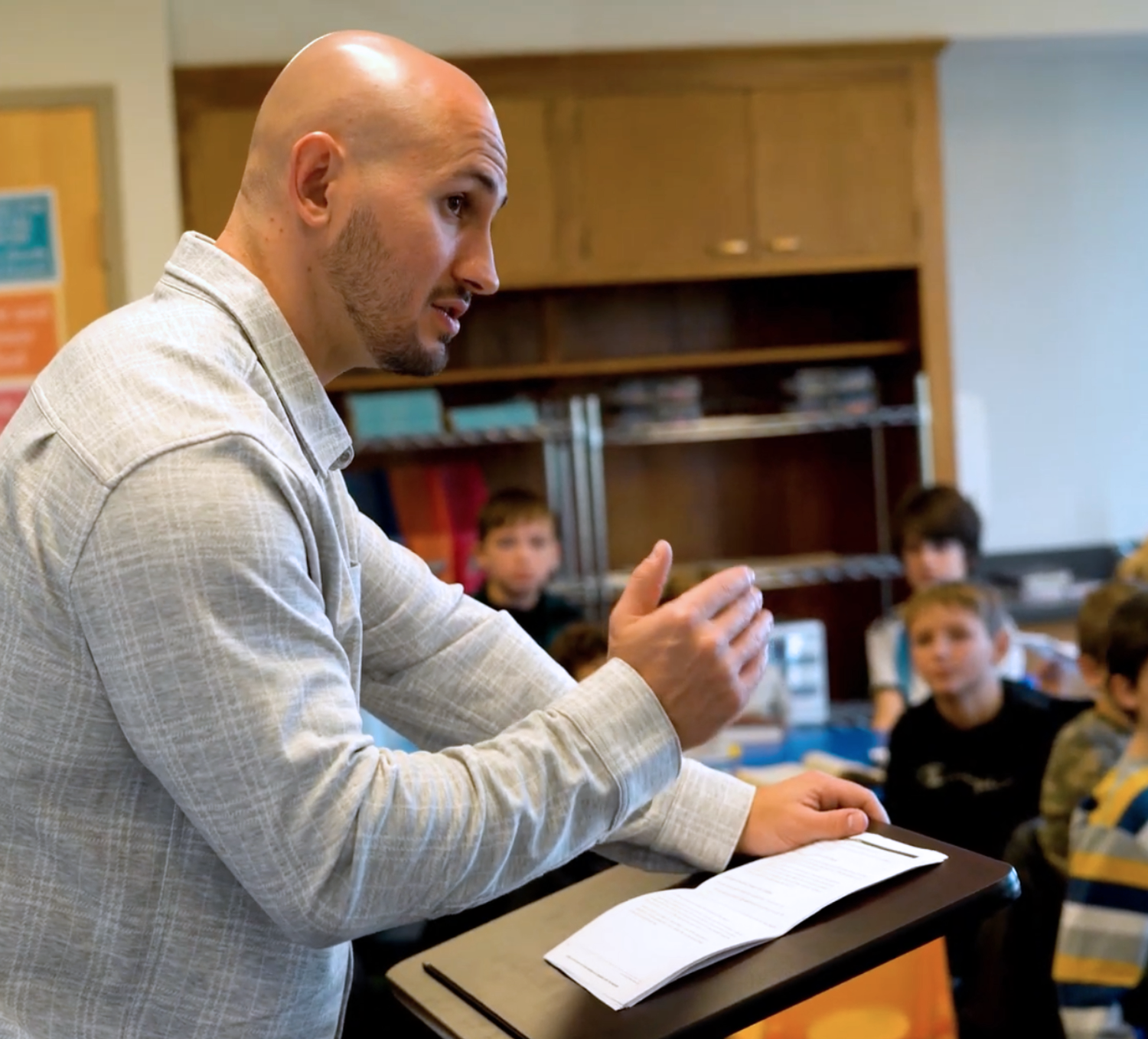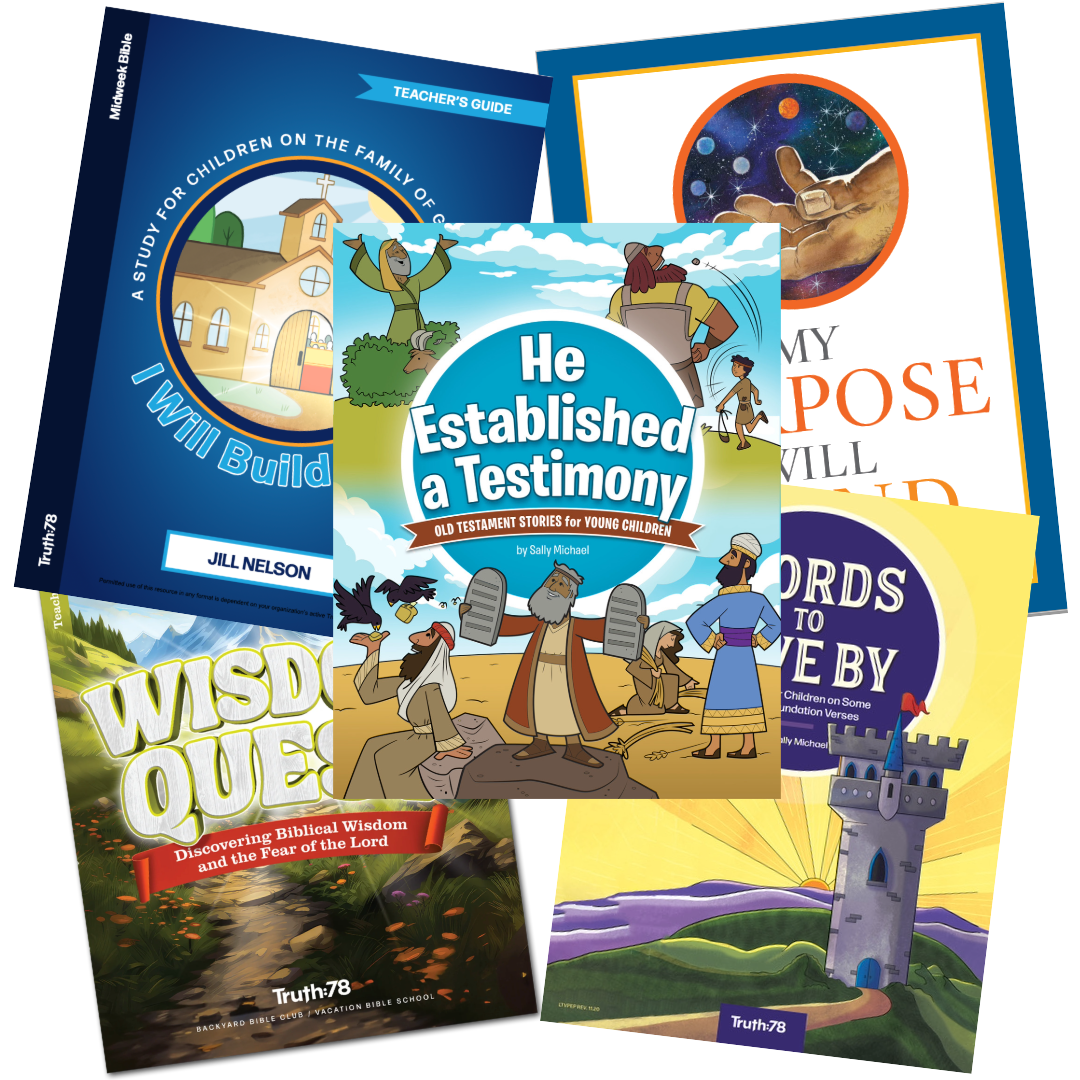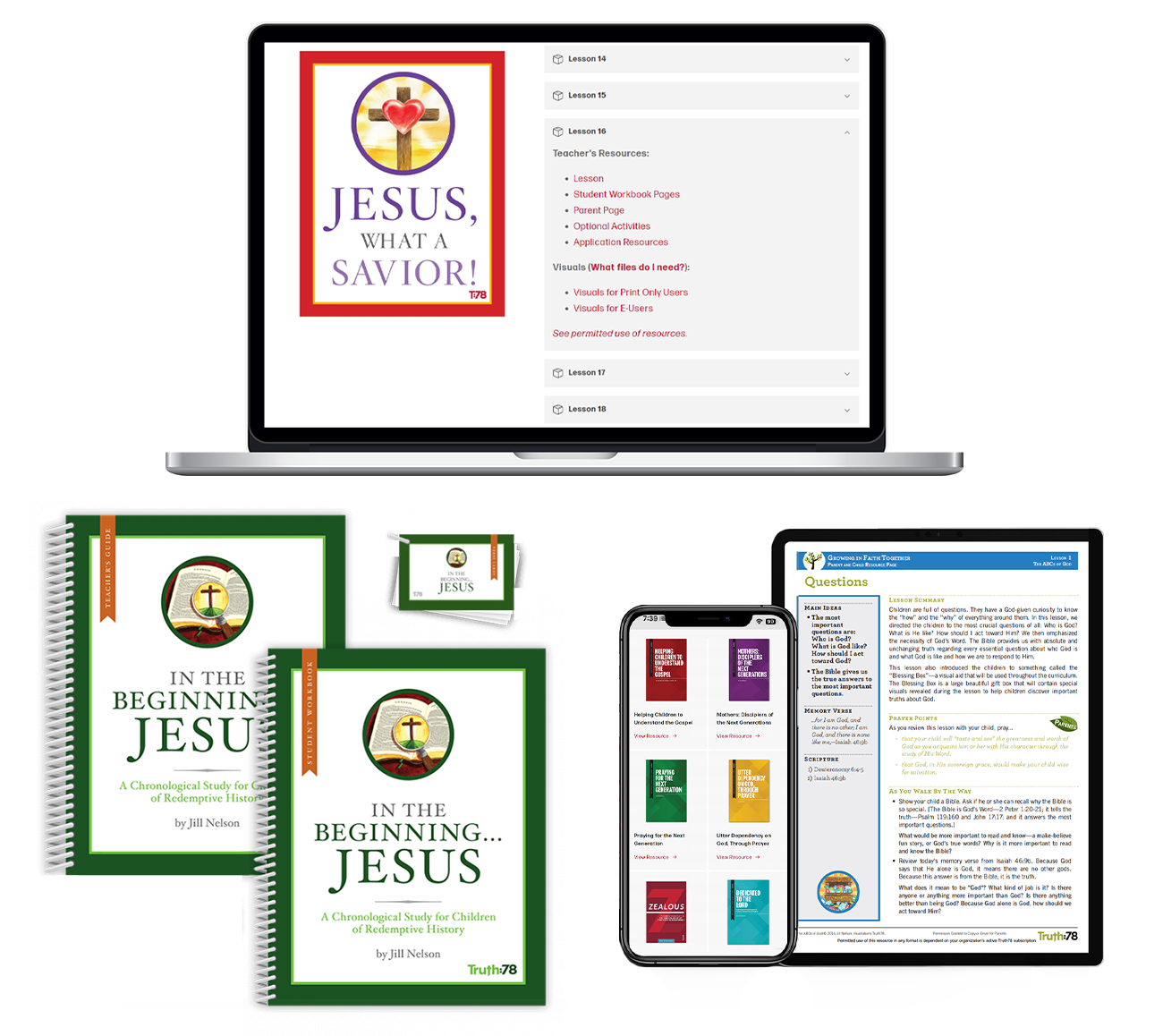"...tell to the coming generation the glorious deeds of the Lord"
Psalm 78:4

Teach big truths to engage young hearts
- Proclaim a grand and glorious vision of the Triune God
- Help children and youth see their identity as God’s image bearers and their desperate need for salvation
- Declare the immeasurable richness of the gospel and implore them to whole-heartedly repent and believe in Jesus
- Guide them to walk as Christ's disciples for their everlasting joy
"It teaches a big view of God and a smaller view of man, putting us in right perspective to worship the Almighty."
Ben Howard, Watson Chapel Baptist Church

a testimony...to teach...children (Psalm 78:6)
Disciple the whole child with the whole Bible
- Beyond storytelling – Systematically teach children the breadth and depth of Scripture
- Beyond conveying information – Equip teachers to engage minds, hearts, and wills as they lead children to actively study the Bible
- Beyond moral lessons – Impress the need to respond in genuine faith that bears Spirit-empowered fruit
- Beyond entertainment – Maximize time spent in spiritual instruction in the classroom
- Beyond busy-work - Provide meaningful activities that foster biblical engagement
- Beyond the classroom – Partner with parents in a way that promotes robust discipleship
- Beyond short-term programming – Establish a long-term plan for proclaiming the whole counsel of God from birth to adulthood
"The teachers at our church are so impressed with the systematic plan for teaching rich theological truths to children in a way that they can understand and in a way that brings about heart transformation."
ELLIE COURSEY Director of Preschool and Children’s Ministries, First Baptist Church, Henderson, KY
so that they should set their hope in God (Psalm 78:7)
Guide the next generation to an unshakable hope
"If you embrace Truth 78, both as a truth and as a curriculum, what you'll be doing is setting a generation free from hoping in all the wrong things!" John Piper
Try curriculum with a free 30-day trial of our Truth78+ subscription.
Not sure which route to take? Schedule a free consultation with our Manager of Ministry Expansion!

Yes, you can do this
We're here to provide everything you need to lead in heart-engaging teaching
- Easy-to-follow teacher’s guides and teaching materials
- Training videos and PDFs
- Lesson prep to help teaching overflow from the heart
- Readily available and highly experienced customer service
"Truth78's curriculum does a great job of teaching children the Bible and theology in age appropriate ways. It is clear and easy to use." Dustin Butts, Mount Vernon Baptist Church

Get curriculum in the format you need
Purchase in print, through yearly digital access, or through the Truth78+ subscription.
How can Truth78 curriculum work for your church?
How is Truth78 curriculum different from unified curriculum where students throughout all age groups are taught the same basic Bible content?
Truth78 curriculum is age-graded, meaning the material – both in regard to content and method of presentation – is tailored to align with what children can more readily understand and how they best learn at specific ages.
Because Christian discipleship involves instructing the mind, engaging the heart, and influencing the will, it’s extremely important that our teaching takes into account the whole child and their developmental stages (i.e. fine motor, speech/language, cognitive/intellectual, and emotional/social development).
We believe that the breadth and depth of biblical content presented at various ages needs to be carefully considered. Think of how children are taught to read and write. There is a progression of concepts and skills: letters, simple words and phrases, sentences, etc. Our curriculum is designed to teach children in this type of precept-upon-precept manner. By doing this, over time, we are giving children the essential building blocks needed to understand the whole counsel of God.
Our scope and sequence, from nursery onward, has a very intentional flow that introduces children to specific biblical concepts with increasing breadth and depth as they age. For example, our sixth grade curriculum teaches the important doctrine of God’s providence – His sovereign rule over all things. This can be a very challenging doctrine to explore and embrace. However, our earlier curricula have carefully laid the biblical foundations for this doctrine by teaching and explaining the attributes of God, His good and perfect promises, His plan of redemption as seen in the Person and work of Christ, seeing His hand throughout all the narratives of Scripture, etc.
What are some disadvantages of using a curriculum that is designed to teach all ages the same basic Bible content?
First of all, let’s acknowledge the appeal of using a unified study. It’s definitely easier in some ways – everyone is “on the same page” as you go through the Bible (usually chronologically), giving you a sense of fulfilling the commitment to teach the whole counsel of God and promising an easier means of home discipleship as parents can discuss the same content with their children of different ages.
Unfortunately, this approach doesn’t take into account the educational needs of children at various ages. Consider again how children are taught various subjects and skills in a school setting. They learn the alphabet before they learn to read and write. They learn numbers before addition and subtraction. In other words, certain concepts require prior knowledge. This is no different with biblical truths. Children can grasp “God is sovereign” in a basic way, but to truly understand deeper concepts like His providence over all things, they need key foundational truths that have been introduced and explained over time.
A unified curriculum often introduces young children to concepts and biblical narratives beyond their ability to understand, missing the opportunity to first ground them in a more simple but necessary biblical “alphabet.” For example, teaching preschoolers about the particular Levitical sacrifices is not foundational at this age and presents concepts that are way beyond their ability to grasp.
Another concern is that unified curricula are typically built on a chronological approach that relies heavily on the narratives of Scripture. While narratives are important, children need more than stories – they need a systematic theology crucial for understanding and living out the Christian life. They need to be taught doctrines concerning the Bible, the triune God, man, salvation, the church, heaven, etc. Take, for example, the New Testament epistles. They are loaded with deep and rich doctrinal truths on which the Christian life is grounded and through which believers grow and mature. These portions of Scripture are often minimized when the focus is mainly on narratives.
So yes, while we understand the appeal of a unified curriculum, we believe that it does not serve the needs of children best, and falls short of providing them with the necessary breadth and depth of the whole counsel of God.
How can churches adapt age-graded curriculum to work in situations where you have multiple ages in the classroom?
Ideally, children are best taught within limited age ranges. It’s impractical to think that a classroom of PreK-6th graders can fully benefit from any particular age-graded study. But for some churches, combining ages is a necessity. However, we would still highly recommend grouping preschool, and maybe even kindergarten, separately from elementary age children. If possible, early elementary (1st-3rd) should be separate from old elementary (4th-6th). Our curriculum scope and sequence offers help by providing the narrow “targeted” age for each study along with a wider age-range.
Many churches have successfully implemented our scope and sequence in their multi-age classrooms. We also provide additional help for teachers in how to teach in these more challenging settings. See https://truth78.org/blogs/blog/tips-for-teaching-in-multi-age-classrooms
How long does it take for a teacher to prepare to teach Truth78 curricula?
This will vary depending on your style and familiarity with the curriculum. In general, however, the time may range from one and a half to two hours per lesson.
To simply read and understand the lesson and get visuals together, you could probably prepare in 30 minutes to an hour, but if you want to teach from an overflowing heart, spending time throughout the week is really beneficial.
One teacher outlined her lesson preparation in this way:
- A week before the lesson, I read through the entire lesson and workbook to get the big picture of what is going on in the lesson. (15 minutes)
- After reading through the lesson, I spend some time looking up the Scripture texts. I meditate on what this lesson is saying about God and what it means for me personally. Throughout the week, I think about the lesson and the texts, and try to internalize how it applies to my life at this time. In order to be authentic in my teaching, I want to be spiritually prepared by really understanding and loving the truth that is presented. (30-45 minutes looking up texts, etc.)
- Several days before the lesson I get all the visuals together and plan how I am going to incorporate the visuals in the teaching. I sometimes teach the lesson quickly to my spouse, using the visuals as I would in teaching the children. (30-45 minutes)
How much time is required to teach the lesson in a Sunday school class?
Classroom time could run between 45 and 90 minutes. There are two essential components of a class time:
- Teaching of the Word: Lesson presentation
- Application: What did I hear? What do I understand about what I have heard? How do I hear God calling me to respond?
All other activities should be structured to support these two components. Other activities may include transition time, worship, prayer, Scripture memorization, and other optional activities.

Equip the families in your church for discipleship
Provide resources for home discipleship, Scripture memory, Bible study, engagement in the church service, and more.








